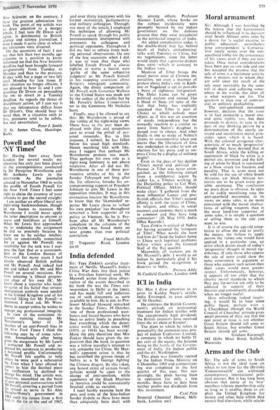Powell and the `NY Times'
Sir: Having been away from London for several weeks my attention has only just been drawn to the correspondence conducted by Mr Peregrine Worsthorne and Mr Anthony Lewis in the SPECTATOR. As the journalist selected in November 1968 to write the profile of Enoch Powell for the New York Times I feel some right to claim the courtesy of your columns to put the record straight: I am neither an effete liberal nor right-wing backwoodsman, though let me hasten to reassure Mr Worsthorne I would never apply the latter description to anyone as suave and fastidious as himself. When Mr Lewis first approached me to undertake the assignment he did so precisely because he knew me to be neither intellec- tually or emotionally committed for or against Mr Powell; my suitability for the task was I sup- pose the fact that as a correspon- dent in the London Bureau of Newsweek for many years I had closely observed British politics and Mr Powell. And indeed had met and talked with Mr and Mrs Powell on several occasions. Far from selecting `a liberal progres- sive chap of his own ilk', Mr Lewis chose a reporter who made 110 secret of his belief that stricter immigration controls were needed in the United Kingdom and of his Personal liking for Mr Powell—a statement I must ask Mr Wors- thorne to accept unless he wishes to impugn my professional integrity. In view of the consistent in- nuendo running through Mr Worsthorne's letter of 24 October of an anti-Powell bias in the New York Times I think the following may be of some relev- an. ce. Immediately after being given the assignment by Mr Lewis I contacted Mr Powell and re- quested his assistance in producing balanced profile. Unfortunately Mr Powell felt unable to help unless he were paid a substantial fee. Even when I later offered to submit to him the finished piece or verification he declined to change his mind. The article was, therefore, assembled on the basis or past personal conversations with Mr Powell, covering a period from his refusal to serve in Sir Alec Douglas-Home's government in 1963 until his return from a first v'sit to the us at the end of 1967, and over thirty inteuiews with his former ministerial, parliamentary and military colleagues. Through- out most of the article I employed the technique of allowing Mr Powell to speak through his public pronouncements interspersed with comments by colleagues and political opponents. Throughout I did my best to refrain from mak- ing personal observations. On one of the few occasions when I did, it was to— state that those who labelled Enoch Powell a classic rightist or worse a fascist were 'guilty of the same subjective judgment' as Mr Powell himself in his sweeping assertions about Britain's immigrant community. Again, the direct comparison of Mr Powell with Governor Wallace in the United States was made not by the author of the profile but by Mr Poviell's fellow Conservative NIP in the Commons Mr Nicholas Scott.
Finally, may I be allowed to say this: Mr Worsthorne is proud of the virility of his right-wing views. These have in the past been de- ployed with 6Ian and scrupulous care to avoid the pitfall of per- sonal innuendo. But in this instance. I submit, he has fallen below his usual high standards. Hence matching like with like, may I suggest that perhaps Mr Worsthorne protests too much. That perhaps his own role as a right-wing luminary is not .above suspicion. After all did not Mr Worsthorne in one of those pro- vocative articles of his in the Sunday Telegraph not long after the Tet offensive, forsake his un- compromising support of President Johnson to join Mr Lewis in the opposition trenches. It may in this connection interest Mr Worsthorne to know that the likeminded' re- porter Mr Lewis chose to 'reflect his own prejudice' has throughout remained a firm supporter of us policy in Vietnam. So be it. Per- haps after all Mr Worsthorne's complaint in the columns of the SPECTATOR was based more on sour grapes than true political conviction.
Frank Melville 22 Tregunter Road, London sw10






















































 Previous page
Previous page